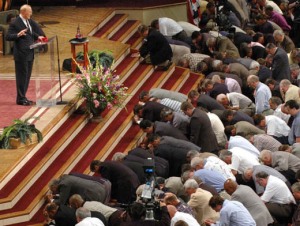By: Heather Ellerbrock
The other day while driving in the car with my dad, he told me a story about a 16 year old who upon exiting the highway way to fast, hit a bump and proceeded to flip his car in the air over two lanes of traffic landing on a hill hundreds of feet away from where this all started. We then got into a conversation about how parents, teachers, etc. in response to such reckless driving from teenagers immediately provide a solution of raising the driving age instead if attacking the problem head on (i.e. require drivers ed for all and at least 1 year, from 15-16, of driving with a permit and so on). Then I saw this video made by Protect Families (the group responsible for Prop. 8 in California):
Despite the fact that I think this video is pure propaganda, just like the adults who believe the solution to reckless teenage driving is to raise the driving age, these parents believe banning gay marriage is the solution to ensure their young children are not taught it in school (instead of coming to a consensus with the school board and community, etc that waiting until sex ed to introduce the idea of homosexual marriage is a better idea…as, in the video, the parents themselves say). On a side note, notice these parents say that because gay marriage is legal and they disagree with it, it is only now they are bigots; and how can you teach gay marriage in mathematics?
Moving on…
After the conversation with my dad, and after viewing the video, I looked to a New York Times Article titled, “Mormons Tipped Scale in Ban on Gay Marriage” and this got me thinking. How can a democracy be the best answer when special interest groups are able to impose their views on an out-group in a totalitarian way? Now, I am in no way suggesting I do not believe in democracy. I am simply stating that it has become too easy for 48% to become an unrepresented minority. Furthermore, through the simplicities of putting measures on ballots that represent special interests – in this case gay marriage – the line between church and state is becoming more and more gray each passing year. In reference to Prop. 8, a member who was part of the fund raising for the propositions passing had the following to say: “I ask for your prayers that this e-mail will open the hearts and minds of the faithful to make a further sacrifice of their funds at this urgent moment so that God’s precious gift of marriage is preserved.” Many will argue that if gay marriage was the majority, there would still be a ~48% minority that would disapprove of the measure. I say to them that at least they can marry the person they love.
So now, after talking to my dad, seeing the “Protect Families” video and realizing that the main reason Prop. 8 did not pass was in most part because of one special interest group, I then looked to Colorado who in the 2008 election actually tried to address this problem; at least when it came to constitutional initiatives (remember, in 2006 gay marriage was banned in Colorado). As most of you may recall, on Colorado’s ballot this year we had Ref. O which aimed to “make it harder” for constitutional initiatives to make it on the ballot. This would have included (1) a signature requirement amount equal to 6% of votes cast for most recent governor and (2) 8% of all signatures to be collected from each congressional district. Once again, and in a way that can only be seen a sheer irony, the minority that Ref. O was trying to protect lost by 48-52%.
In my opinion and judgment, this all boils down to religion. Now let me preface this with saying I am not attacking religion. I am saying that when it comes to issues that appear on ballots each year concerning gay marriage, abortion, etc., these measures are able to appear on the ballot from fund raising that mainly comes from religious institutions. And since they are not required (at least in Colorado) to gain signatures from all congregational districts, they can then pick and choose where they will most likely get signatures for the measure. Think about Amendment 48, it failed famously but was able to appear on the ballot. 1/6 of all Amendment 48’s “Yes” vote came from El Paso county alone (compare with 1/15 total of “Yes” votes coming from Denver). I wonder where the people who wanted the measure on the ballot focused their efforts?
A democracy goes wrong when we are able to put amendments on constitutions that take away rights from people. Instead of attacking the problem from the inside out and coming to a consensus, a small majority gets to define what life will be for other Americans. Just as most are irrational to think that raising the driving age to 18 will cure reckless “teenage” driving, the same people are just as irrational to think that denying rights to deserving American citizens is their right in our democracy.

